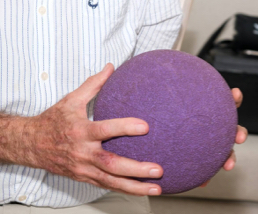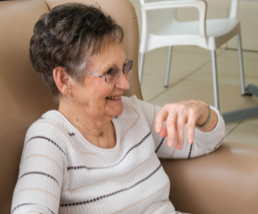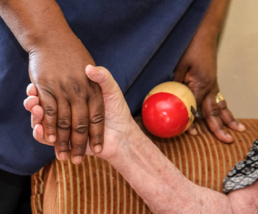
Caring for a loved one with Parkinson’s disease can be challenging. As a progressive disease, the symptoms worsen over time. Knowing what to expect and how to manage it ahead of time can help both you and the person you’re caring for deal with the lifestyle changes and challenges as they progress.
If you’re taking care of someone with Parkinson’s, there are a number of things you can do to help manage the situation.
If you’re taking care of someone with Parkinson’s, there are a number of things you can do to help manage the situation.



1. Learn more about Parkinson’s
Parkinson’s disease is a progressive, neurological disease that mainly affects mobility. After Alzheimer’s, it is the second most common neurodegenerative disease. Parkinson’s disease is caused by the destruction of nerve cells in a part of the brain called the basal ganglia. This results in symptoms such as rigid movements, poor balance and tremors amongst others. There are medications and surgery that can help alleviate the symptoms. However, there is no way to stop the progression of the disease completely.
Parkinson’s disease is a progressive, neurological disease that mainly affects mobility. After Alzheimer’s, it is the second most common neurodegenerative disease. Parkinson’s disease is caused by the destruction of nerve cells in a part of the brain called the basal ganglia. This results in symptoms such as rigid movements, poor balance and tremors amongst others. There are medications and surgery that can help alleviate the symptoms. However, there is no way to stop the progression of the disease completely.
2. Give a helping hand
As the symptoms of Parkinson’s progress, everyday tasks such as getting dressed, cooking, going to the shops or cleaning the house can become more challenging. Where necessary, offer to help lighten the load. However, it’s important to allow the person you’re caring for to remain as independent as possible. Let them to do as many activities as they can manage on their own. Switching to new ways of doing things can help make certain activities more manageable. Consider using an electric toothbrush to help with hand tremors. Choose showers with a stool rather than potentially slippery bath tubs. Make dressing easier by laying out clothes ahead of time, and choose clothing without zippers, buttons, buckles and laces where possible.
As the symptoms of Parkinson’s progress, everyday tasks such as getting dressed, cooking, going to the shops or cleaning the house can become more challenging. Where necessary, offer to help lighten the load. However, it’s important to allow the person you’re caring for to remain as independent as possible. Let them to do as many activities as they can manage on their own. Switching to new ways of doing things can help make certain activities more manageable. Consider using an electric toothbrush to help with hand tremors. Choose showers with a stool rather than potentially slippery bath tubs. Make dressing easier by laying out clothes ahead of time, and choose clothing without zippers, buttons, buckles and laces where possible.
3. Stay active and engaged
Staying active helps improve strength, balance, memory, and even stave off depression and anxiety. Encourage the person you’re caring for to get moving by going for regular walks and taking part in low-impact activities such as swimming, yoga or light aerobics classes. And while keeping fit is important, maintaining healthy interests and hobbies is also an essential part of maintaining a good quality of life. Don’t let reduced physical abilities stop the person you’re caring for from pursuing their favourite pastimes. Specially adapted tools are available to help with things like holding a paintbrush. Or, if playing a musical instrument has become too strenuous, go to a concert or listen to music instead.
Staying active helps improve strength, balance, memory, and even stave off depression and anxiety. Encourage the person you’re caring for to get moving by going for regular walks and taking part in low-impact activities such as swimming, yoga or light aerobics classes. And while keeping fit is important, maintaining healthy interests and hobbies is also an essential part of maintaining a good quality of life. Don’t let reduced physical abilities stop the person you’re caring for from pursuing their favourite pastimes. Specially adapted tools are available to help with things like holding a paintbrush. Or, if playing a musical instrument has become too strenuous, go to a concert or listen to music instead.
4. Maintain a healthy diet
A healthy diet plays an important role in the continued wellbeing of a person living with Parkinson’s. Include plenty of high-fibre foods, as these can help with constipation (a common symptom of Parkinson’s). Serve calcium-rich food such as cheese and yoghurt to prevent osteoporosis. This is particularly important, as a person with Parkinson's is more likely to fall and suffer from a fractured bone. Late-stage Parkinson’s can make swallowing and chewing difficult. If this becomes a problem, prepare moist, soft foods. Thick drinks like protein shakes are a good choice. Avoid foods that crumble or need to be held together, as they can be more challenging to eat.
A healthy diet plays an important role in the continued wellbeing of a person living with Parkinson’s. Include plenty of high-fibre foods, as these can help with constipation (a common symptom of Parkinson’s). Serve calcium-rich food such as cheese and yoghurt to prevent osteoporosis. This is particularly important, as a person with Parkinson's is more likely to fall and suffer from a fractured bone. Late-stage Parkinson’s can make swallowing and chewing difficult. If this becomes a problem, prepare moist, soft foods. Thick drinks like protein shakes are a good choice. Avoid foods that crumble or need to be held together, as they can be more challenging to eat.
5. Look for worsening symptoms
As Parkinson’s disease progresses, symptoms will likely change and worsen over time. In the beginning, a person with Parkinson’s may be able to do most of the things they did before. However, changes in their physical abilities may be subtle at times, and the person you’re caring for may not even notice it themselves. Be observant, and keep an eye out for changes in symptoms and moods, especially after any changes in medication or therapy.
As Parkinson’s disease progresses, symptoms will likely change and worsen over time. In the beginning, a person with Parkinson’s may be able to do most of the things they did before. However, changes in their physical abilities may be subtle at times, and the person you’re caring for may not even notice it themselves. Be observant, and keep an eye out for changes in symptoms and moods, especially after any changes in medication or therapy.
6. Manage depression
Nearly half of people with Parkinson’s experience depression at some point. This is understandable, as a loss of independence and such drastic changes to their lifestyle can leave them feeling helpless, isolated and anxious. Depression is not only bad for their mental wellbeing but can worsen physical symptoms as well. Be sure to talk to them about their feelings and seek advice from a professional if necessary.
Nearly half of people with Parkinson’s experience depression at some point. This is understandable, as a loss of independence and such drastic changes to their lifestyle can leave them feeling helpless, isolated and anxious. Depression is not only bad for their mental wellbeing but can worsen physical symptoms as well. Be sure to talk to them about their feelings and seek advice from a professional if necessary.
7. Contact us for support and assisted living
You might reach a point where you can no longer take care of your loved one living with Parkinson's as the disease progresses. Rest assured, we are fully equipped to provide the professional care, facilities and support Parkinson’s patients need to stay safe, healthy and active. We currently manage seven retirement villages with assisted living and frail care units across South Africa and our residents are looked after by our national nursing services manager, nursing services manager, sisters, nurses and care workers. Residents also have access to a doctor, occupational therapist and support services. Our team will assess the needs of each resident to ensure they get the exact level of care they need throughout every stage of their life with Parkinson’s.
You might reach a point where you can no longer take care of your loved one living with Parkinson's as the disease progresses. Rest assured, we are fully equipped to provide the professional care, facilities and support Parkinson’s patients need to stay safe, healthy and active. We currently manage seven retirement villages with assisted living and frail care units across South Africa and our residents are looked after by our national nursing services manager, nursing services manager, sisters, nurses and care workers. Residents also have access to a doctor, occupational therapist and support services. Our team will assess the needs of each resident to ensure they get the exact level of care they need throughout every stage of their life with Parkinson’s.
If you would like to find out more about our villages, here's more, or head over to our homepage for more information about us.
Parkinson’s is a progressive disease with symptoms that worsen over time. By equipping yourself with more information about the disease, along with some practical advice, you can manage their needs and ensure a better quality of life. Read on for insights and advice on the best ways to care for someone with Parkinson’s disease.
